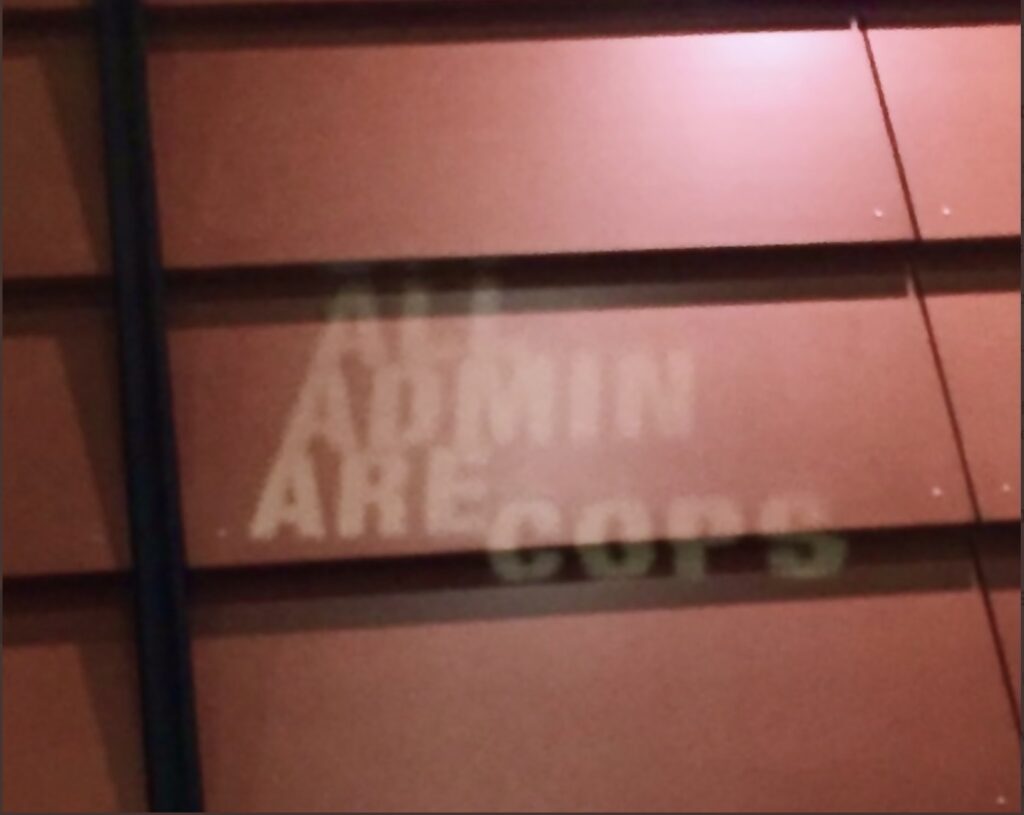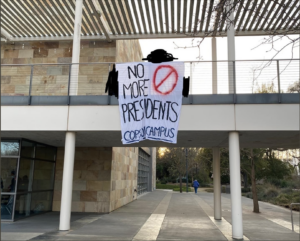All Chancellors Are Bastards
Posted: September 2nd, 2022 | Author: ucdcoc | Filed under: Disorientation Guide '22-'23 | Comments Off on All Chancellors Are Bastards
The crises that our university faces do not result from a simple case of mismanagement. There isn’t some “better candidate” for chancellor who would do the job more effectively or ethically. When things go poorly, the administration may apologize (in a legally-nonbinding manner, of course). They may in fact promise to do better and listen more. When one admin succeeds another, the newcomer will proclaim in doublespeak a debt of gratitude to their predecessor, a deep affinity with them, while also expressing the need for a sea change, a fundamental difference they claim to represent. But they are never your allies, and they don’t want to change the status quo. Administrators are administrators, that is, technocrats & functionaries, no matter how well-meaning any one of them may be. Chancellors, presidents, and regents have these positions because they are prepared to do what these positions require of them. This includes leveraging the language of diversity and inclusion while enacting policies that make education less accessible and less affordable, that make the university a worse place to work, and that prevent us from taking any actions with the potential to create real change. It is the role itself that needs to be abolished.
From Gary May calling Covid-19 “a four day head cold” to Janet Napolitano’s expansion of border policing during her tenure with the Department of Homeland Security, UC administrators have defended “business as usual” by compromising the safety and well-being of many in and outside the university. They excel at their duties: to facilitate the profit-making capacity of the UC and to suppress resistance and dissent. Let’s take a look:
Gary May: UCD Chancellor (2017- present)
The current UCD chancellor, Gary May, took office in 2017. Since 2015, he has been on the board of Leidos, a defense contractor profiting from the inhumane border control regime. He receives a salary of nearly $300,000 from Leidos, on top of his roughly $2 million in stock. (This is of course in addition to his UC salary of roughly half a million dollars.)
Back on campus, May has pushed policies that disregard the needs of disabled and immunocompromised students. From removing mandatory mask and testing requirements when COVID-19 rates were equivalent to the Omicron peak to comparing COVID-19 to a mild flu, the university has repeatedly placed profit over student lives, with May presiding over these ableist policies.

In Sacramento, May’s pet project, Aggie Square, has been faced with lawsuits claiming that developers violated the California Environmental Quality Act by failing to mitigate air pollution and housing displacement. AFSCME 3299, a UC employer union, is one of the organizations suing the university. Located in Oak Park, a historically redlined neighborhood, Aggie Square will increase local housing prices, generate traffic, and worsen air pollution, displacing residents of color in favor of “development.”
Michael Drake: UC President (2020-present)
Before he became President of the UC system, Michael Drake was chancellor of UC Irvine. In 2010, during Drake’s tenure as Chancellor, UC Irvine invited Israeli ambassador Michael Oren to campus to give a talk. A group of students, many of them members of the Muslim Student Union, briefly disrupted the Israeli ambassador’s speech in protest of ongoing human rights violations and settler-colonial violence perpetrated by the apartheid State of Israel against Palestinians, violence UCI tacitly endorsed by inviting Oren to speak. As the MSU noted, “Propagating murder is not a responsible expression of free speech.”
But administrators like Michael Drake and the police they wield exist to ensure that some types of speech – speech by the powerful defending capitalism and the state – are freer than others. UCPD handcuffed each student who disrupted Oren, removed them from the area, and detained them until Oren could finish his speech. Later, the administration charged the students with student conduct violations for disrupting a public event on university property. After pursuing disciplinary charges against those who had disrupted the speech, Drake and the UCI administration suspended the MSU and sentenced its members to 50 hours of community service as punishment; this was later raised to 100 hours. Other student groups who had organized even more disruptive protests of speaking events in the past had not been disciplined in the same way as the MSU, a fact that suggests Drake and UCI were targeting Muslim students for their support of Palestine.
Following the university’s disciplinary actions, the Orange County DA filed criminal misdemeanor charges, presumably with university support, against the students, threatening them with prison time. While many faculty spoke out against the DA’s decision, Drake did not. Ten of the students were convicted of two misdemeanors and sentenced to three years of probation, 56 hours of additional community service, and a fine. Both the university and the state punished these students for supporting the struggle for freedom in Palestine. Drake’s disciplining of the Irvine Eleven renders him complicit in criminalizing them and demonstrates his willingness to repress students fighting against settler-colonialism and state violence. Unwilling to offer even the most minimal support to marginalized people, Drake has instead been a friend of the gun and the badge.
Janet Napolitano: UC President (2013-2020)
Janet Napolitano was President of the UC system from 2013 to 2020. Before coming to the University of California, Napolitano served as the Secretary of the Department of Homeland Security under President Obama. As Secretary of DHS, Janet set new records for deportations every year of her term. Under the guise of “public safety,” she expanded the xenophobic, carceral, and white supremacist “Secure Communities” Program, or SComm, all but guaranteeing the deportation of an estimated 1.5 million people. In concert with the Obama administration’s border militarization policies, Napolitano heavily invested in border security, more than doubling the number of ICE and CBP agents and personnel. According to DHS, the agency deployed “historic levels of manpower, resources, and technology” under her leadership. Janet’s DHS bragged of these historic levels of investment in maintaining border imperialism, measured only in the lived experience of deportation and detention. Following the 2008 crisis, Congress allocated almost $6 billion to Napolitano’s DHS as part of the Recovery Act of 2009. Under her direction, this funding financed the expansion of the border control apparatus, with significant sums directed toward the proliferation of and investment in state-of-the-art surveillance technologies, including “mobile surveillance, thermal imaging devices, ultra-light detection, backscatter units, mobile radios, cameras, and laptops for pursuit vehicles, and remote video surveillance system enhancements.”
It’s telling that directly after the period of unprecedented tuition hikes accompanied by student protests and the UC-wide occupations they inspired, the UC chose the nation’s most prominent cop, border enforcer, and surveillance czar as its next president. As UC President, Janet expanded the already bloated UC Police budget by an average of 7% per year, from $98.3 million in 2013-14 to $138.2 million in 2018-19. Over this period, police budgets were doubled or even tripled at some campuses. System-wide, the $40 million increase from the beginning to the end of Janet’s term amounted to a more than 40% expansion of policing capacity. At this same time, the UC was imposing severe austerity measures and tuition hikes, provoking continuous student and worker opposition. In effect, this swell in policing was a means to secure austere financial plans and quell a nascent uprising.
Finally, Janet demonstrated her utter antipathy toward graduate students struggling under the burdens of rising housing costs by threatening those involved in the COLA (Cost of Living Adjustment) wildcat strike with dismissal.
Mark Yudof: UC President (2008-2013)
Considered a legal expert on the subject of freedom of expression, Mark Yudof conflated the protests of groups like Students for Justice in Palestine with racist and bigoted acts (a noose hung up at UCSB, the LGBT Resource Center vandalized at UCD), as if these were at all equivalent threats to the UC’s “tolerant” atmosphere.
Yudof once made a joke about his excessive salary in an interview with the New York Times, which didn’t elicit much laughter among UC students: tuition nearly doubled over his tenure as UC President (2008-2013). He argued that fee increases were unavoidable due to the 2008 financial crisis and the state’s subsequent reduction of the UC budget. This perfectly demonstrates how administrators are beholden to their roles, in that they can only “make the best” of capitalism’s crises. They can’t critique or challenge the system they consider to be natural. To administrators, the “natural” course of action is, as ever, to shift the burden onto students and workers while blaming everything on forces outside their control.

Linda Katehi: UCD Chancellor (2009-2016)
Linda Katehi was accused of numerous conflicts of interest during her time at Davis. It was found that she “failed to follow procedure” regarding travel reimbursements and use of student fees. Then there were the allegations of nepotism due to her son and daughter-in-law receiving jobs and raises at UCD. Worse still were her well-compensated appointments to the boards of institutions such as DeVry University, a shady for-profit school that has faced numerous class action lawsuits related to misleading advertising and ripping off students. DeVry has been placed under investigation for its deceptive practices. Katehi essentially used her position to enrich herself and her family in any way she could.
Her instincts to shield wealth were strong enough to have sometimes physically violent consequences. In November 2011 she directed campus police to dismantle the Occupy UC Davis tent encampment on the Quad, leading to the infamous “Pepper Spray Incident.” Afterwards, her PR statements went from defensive and accusatory toward students, to a conciliatory, apologetic tone focused on “healing the campus community” within a few days of global bad press. But her response displayed a characteristic aversion to accountability. She refused calls from that very campus community for her resignation and claimed that she had instructed the police to act “peacefully.” We were unconvinced. An investigation confirmed our suspicions, and although it unsurprisingly failed to frame the events within their political context – that of anti-privatization resistance being attacked by police forces – the Reynoso/Kroll Report nonetheless damningly indicted Katehi’s cohort. It exposed Katehi and her underlings as incompetent, petty authoritarians who ignored and suppressed information that didn’t support their intended course of action.
Katehi consistently demonstrated her priority to control damage rather than address harm meaningfully: so concerned was she about her own image in the wake of international condemnation of the Pepper Spray Incident that this Chancellor spent hundreds of thousands of the school’s money — that is to say, the money paid by students, the money that could have been used to hire teachers, the money that pays workers — hiring outside firms to conceal internet search results about the events. And her own Wikipedia page includes a glorious mise en abyme of shady conduct: “Katehi had once asked an aide to edit her Wikipedia page to protect her reputation.”
Furthering its violent protection of capitalism, the Katehi administration requested in the spring of 2012 that charges be brought against the Davis Dozen, who were accused of engaging in a sit-in protest. While we’d argue that using the legal system to punish protestors puts one on the wrong side of history by default, the charges levied in this case were excessive enough to seem vindictive.
But Katehi’s relationship to repression has deeper roots. In 2010, as Greece was facing brutal austerity measures, Katehi was part of a panel calling for the end of the country’s University Asylum law. The law had been enacted in 1982, a belated response to the Athens Polytechnic Uprising against the military junta. Katehi was a student there when the government used tanks and martial law in an attempt to suppress the movement, killing at least 24 people. After the fall of the junta, the Asylum law kept police forces off of Greek campuses for nearly 30 years. But in response to the waves of anti-austerity protests and strikes in the country, Katehi recommended abolishing the law in the name of “safety.”
Even the UC President had no choice but to recognize that an investigation “found numerous instances where Chancellor Katehi was not candid, either with me, the press, or the public, that she exercised poor judgment, and violated multiple University policies.” A month-long #firekatehi occupation was followed four months later with her ouster. Don’t worry about her well-being, though: she was blessed with a year’s pay at the level of her Chancellor’s salary just for the trouble of having to resign, and continued to receive said salary as a distinguished professor at UCD, while teaching an engineering class per quarter.
ACAB
It’s worth talking about this procession of shitty UC administrators past and present. It’s worth noting their involvement in private and government entities and asking how these interests conflict with their duty to the workers, students, and faculty they are supposed to serve. It’s worth tallying the number of times the regents have approved salary increases just as they’ve pushed fee hikes as an unavoidable necessity for maintaining the solvency of the UC system. And it’s worth remembering their more visible misdeeds – their role in the repression of activists and the stifling of dissent, in overseeing the trend toward militarized police forces becoming a fixture of university life. Let’s not forget – and let’s not let them forget, either. Let’s put them on notice: we will fight to abolish these administrative roles and make a university that is free and fair for everyone.